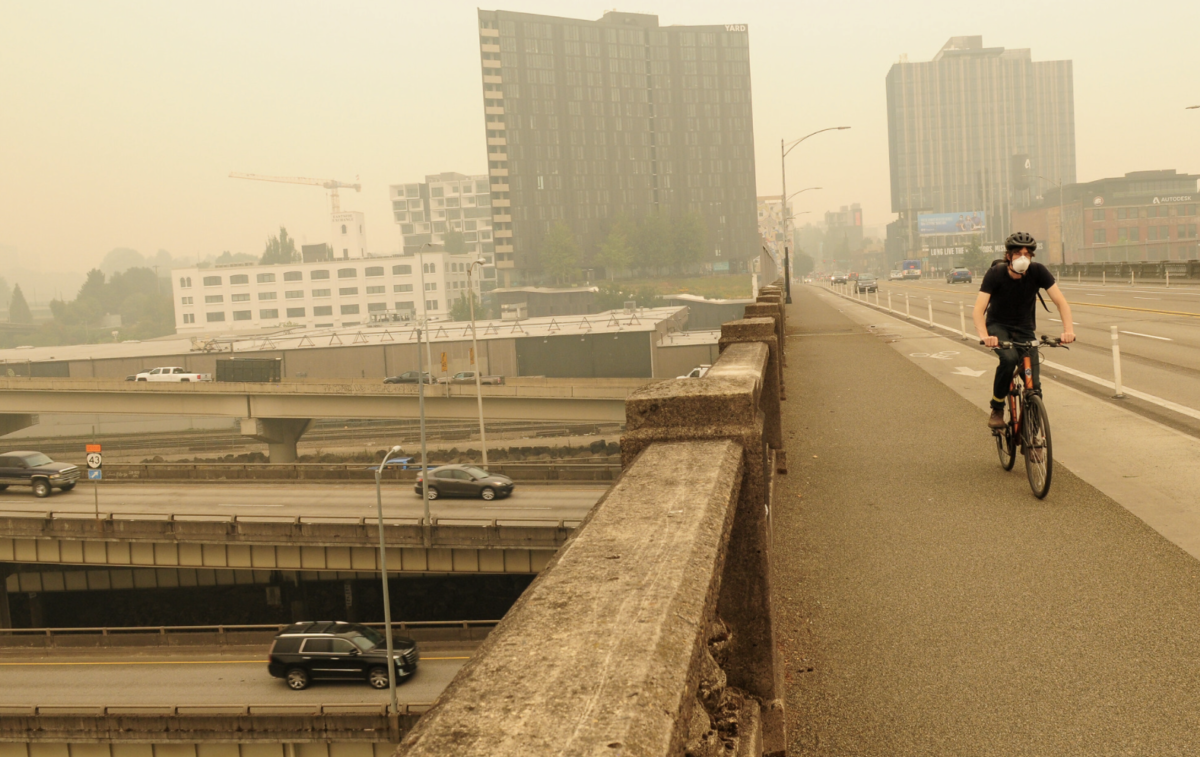
(Photo: BikePortland)
(By Ryan Packer)
Did the lawmakers remember when they could barely see a few blocks due to smoke, and did any of them have to construct makeshift air filters out of box fans and air filters like I had?
Near the end of the Washington legislature’s 2021 session in early April, I wondered how different the content of lawmakers’ speeches and the resulting impact of the laws they were passing would be if most of the state had been covered in smoke from wildfires, as had been the case just a few months earlier. Did the lawmakers remember when they could barely see a few blocks due to smoke, and did any of them have to construct makeshift air filters out of box fans and air filters like I had? Did they expect to spend another month inside due to smoke this year?
I had just watched the chair of the Washington Senate’s transportation committee, Steve Hobbs (a Democrat), join with a small number of other Democrats and the entire Republican bloc on the committee to vote down amendment after amendment to the 16-year transportation funding package that Hobbs had negotiated with other lawmakers, mostly behind closed doors. The amendments included increases to Safe Routes to School programs, statewide bicycle and pedestrian grant programs, transit fare grant programs, and programs designed to connect communities that have historically received less investment in transportation. Hobbs supported these programs, he said, but there just wasn’t room in the package, which was financially “overextended”.
That Washington transportation package, which got no further than out of the transportation committee before the legislative session ended a few days later, includes projects like $500 million to expand a single state highway in Seattle’s suburbs and around one billion dollars for the I-5 project between Washington and Oregon, a project that doesn’t even have a design yet.
Advertisement
Hiding behind the label of jobs is the clear belief that things should continue as they are.
My question about how wildfire smoke may influence an active legislative session hasn’t been answered yet, thankfully, but I did get a discouraging clue as I watched the Oregon legislative session wrap up this past weekend. As much of the state broke temperature records, with Portland hitting 108 degrees, one degree more than the highest temperature ever recorded, the State Senate was debating HB 3055, which allocated funding to highway expansions such a widening I-205 and expanding I-5 at Boone Bridge. They did that just weeks after allowing a proposed spending increase for pedestrian and bicycle projects to fail, mirroring what happened in that Washington Senate transportation committee meeting, due to “lack of funding.” HB 3055, on the other hand, easily passed both chambers. (Governor Brown could still veto.)
Oregon State Senator Chris Gorsek articulated one reason for cognitive dissonance more plainly than most legislators do, during the floor debate on 3055, announcing that “all in all I’d like to vote no, because we need to be moving in the direction of alternative transportation”, but that he would be voting yes because the bill will be a source of jobs. Of course, numerous studies, including ones cited by Washington’s Secretary of Transportation, have shown that large highway projects produce far fewer jobs per dollar spent than commensurate bike and pedestrian projects. Hiding behind the label of jobs is the clear belief that things should continue as they are.
But of course they can’t continue as they are. The legislatures of both states are miles ahead of most other states in the US in terms of passing legislation to reduce emissions and mitigate the impacts of climate change. Oregon’s clean energy bill that passed last week is being heralded as a major win for the environment. Yet transportation remains a huge area of inattention and, frankly, denial. The idea that we should continue to not only maintain our existing fossil fuel infrastructure but expand it at the expense of other programs is a mainstream view for a Democratic legislator in the northwest.
As every segment of the world finds itself in uncharted meteorological territory as climate impacts expand the realm of the likely, it doesn’t seem too hopeful to think that our elected leaders will respond more urgently as the effects become visible, frequent, and deadly. The Washington legislature is actively considering returning for a special session in September to finish passing a transportation package loaded with highway expansion projects. With the summer that is ahead of us, fire and smoke impacts already here, it is truly wild to imagine a legislature coming back to work to choose highways over safe routes to schools. It’s likely going to take larger, more powerful, and more organized opposition to make sure it doesn’t happen.
— Ryan Packer, @typewriteralley, ryan@theurbanist.org
— Get our headlines delivered to your inbox.
— Support this independent community media outlet with a one-time contribution or monthly subscription.

